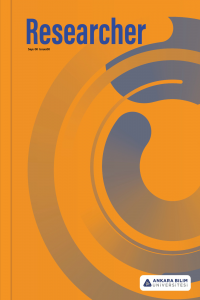İLKÖĞRETİM ÖĞRETMEN ADAYLARININ ÇEVRE TUTUMLARININ FARKLI DEĞİŞKENLER AÇISINDAN İNCELENMESİ
Çevre tutumları, fen ve teknoloji dersi, ilköğretim öğretmen adayı
INVESTIGATION OF THE PRIMARY PRESERVICE TEACHERS' ENVIRONMENTAL ATTITUDES IN TERMS OF DIFFERENT VARIABLES
___
- Araujo, S. N., & Silva, H. M. (2015). Environmental education: investigative activity with students of education young and adults. International Journal for Cross- Disciplinary Subjects in Education (IJCDSE), 6(2), 2202-2207.
- Aydın, F. & Çepni, O. (2010). University students’ attitudes towards environmental problems: a case study from Turkey. International Journal of the Physical Sciences, 5(17), 2715-2720.
- Balcı, A. (2007). Sosyal Bilimlerde Araştırma. Ankara: Pegem Akademi Yayıncılık.
- Büyüköztürk, Ş. (2010). Sosyal bilimler için veri analizi el kitabı: İstatistik, araştırma deseni, SPSS uygulamaları ve yorum. Ankara: Pegem Akademi Yayıncılık.
- Davis, J. (1998). Young children, environmental education, and the future. Early Childhood Education Journal, 26(2), 117-123.
- Erol, G. H. (2005). Sınıf öğretmenliği ikinci sınıf öğrencilerinin çevre ve çevre sorunlarına yönelik tutumları. (Yayınlanmamış yüksek lisans tezi). Pamukkale Üniversitesi Fen Bilimleri Enstitüsü, Denizli.
- Erol, G. H. & Gezer, K. (2006). Prospective of elementary school teachers’ attitudes toward environment and environmental problems. International Journal of Environmental and Science Education, 1(1), 65-77.
- Gökçe, N., Kaya, E., Aktay, S. & Özden, M. (2007).İlköğretim öğrencilerinin çevreye yönelik tutumları. İlköğretim Online Dergisi, 6(3), 452-468.
- Karasar, N. (2003). Bilimsel Araştırma Yöntemi. Ankara: Nobel Yayın Dağıtım.
- Kunt, H., & Geçgel, G. (2013). Öğretmen adaylarının ağaç ve çevreye yönelik tutumlarının incelenmesi. Electronic Turkish Studies, 8(12), 793-807.
- Meydan, A., Doğu, S., & Dinç, M. (2009). Öğretmen adaylarının çevre sorunları konusundaki farkındalık ve duyarlılıkları. Selçuk Üniversitesi Ahmet Keleşoğlu Eğitim Fakültesi Dergisi, 28, 153-168.
- Oweini, A. & Houri, A. (2006). Factors affecting environmental knowledge and attitudes among Lebanese college students. Applied Environmental Education and Communication: An International Journal, 5(2): 95-105.
- Sadık, F. & Sarı, M. (2010). Student teachers‟ attitudes towards environmental problems and their level of environmental knowledge. Çukurova Üniversitesi Eğitim Fakültesi Dergisi, 3,129-141.
- Sarıtaş, E. & Süral, S. (2008) Fen ve Teknoloji Öğretimi Dersine Yönelik Tutum Ölçeği Geliştirme Çalışması. Uşak Üniversitesi Sosyal Bilimler Dergisi, 2(1), 201-213.
- Şama, E. (2003). Öğretmen adaylarının çevre sorunlarına yönelik tutumları. Gazi Eğitim Fakültesi Dergisi, 23(2), 99-110.
- Tahiroğlu, M., Yıldırım, T. & Çetin, T. (2010). Değer eğitimi yöntemlerine uygun geliştirilen çevre eğitimi etkinliğinin, ilköğretim 7. sınıf öğrencilerinin çevreye ilişkin tutumlarına etkisi. Selçuk Üniversitesi Ahmet Keleşoğlu Eğitim Fakültesi Dergisi, 30, 231-248.
- Tekbıyık, A. & İpek, C. (2007). Sınıf öğretmeni adaylarının fen bilimlerine yönelik tutumları ve mantıksal düşünme becerileri. Yüzüncü Yıl Üniversitesi Eğitim Fakültesi Dergisi, 4(1), 102-117.
- Tikka, P. M., Kuitunen, M. T., & Tynys, S. M. (2000). Effects of educational background on students' attitudes, activity levels, and knowledge concerning the environment. The journal of environmental education, 31(3), 12-19.
- Vlaardingerbroek, V. & Neil Taylor, T. G. (2007). The Environmental Knowledge and Attitudes of Prospective Teachers in Lebanon: A. comparative study. International Research in Geographical and Environmental Education, 16 (2), 120–134.
- Yılmaz, A., Morgil, İ., Aktug, P., & Göbekli, İ. (2002). Knowledge of the secondary school and university students on the environment, environmental concepts and problems and suggestions. Hacettepe University Journal of Education, 22, 156-162.
- Yoldaş, C. (2009). Çevre bilimi dersinin sınıf öğretmeni adaylarının eleştirel düşünme becerileri, erişileri ve tutumlarına etkisi (Yayınlanmamış doktora tezi). Dokuz Eylül Üniversitesi Eğitim Bilimleri Enstitüsü, İzmir.
- ISSN: 2717-9494
- Yayın Aralığı: Yılda 2 Sayı
- Başlangıç: 2013
- Yayıncı: Ankara Bilim Üniversitesi
RESPONSE TO COLORS DIVERSIFY DURING THE EXECUTION PHASE OF MOVEMENT
İLKÖĞRETİM ÖĞRETMEN ADAYLARININ ÇEVRE TUTUMLARININ FARKLI DEĞİŞKENLER AÇISINDAN İNCELENMESİ
Cenk YOLDAŞ, Halil İbrahim DEMİR
YAŞAM BOYU ÖĞRENME İLE İLGİLİ LİSANSÜSTÜ TEZLERİN İNCELENMESİ
Emin Tamer YENEN, Hasan Hüseyin KILINÇ, Ayhan BULUT
TURİZM COĞRAFYASI DERSİNİN COĞRAFYA DERSİNE YÖNELİK TUTUMA ETKİSİ
Mehmet Tamer KAYA, Nusret KOCA
KATILIM SERTİFİKASI VERİLMESİNİN ORTAOKUL ÖĞRENCİLERİNDE RESİM YAPMA İSTEĞİNE VE KATILIMA ETKİSİ
